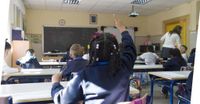On March 27, 2025, the Central Sindical Independiente y de Funcionarios (CSIF), the leading union for public education in Andalusia, unveiled over 100 proposals aimed at alleviating the bureaucratic burden that teachers face. This initiative comes as a response to an escalating crisis that threatens the quality of public education in the region. Alongside a letter addressed to the Minister of Educational Development and Professional Training, CSIF has presented a comprehensive document detailing these concrete and viable measures, all grounded in the daily experiences of educators.
Antonio Pachón, the head of the Education Sector for CSIF Córdoba, emphasized the urgent need for the Junta de Andalucía to commit to addressing this pressing issue. He stated, "The proposals we have submitted should be considered as a priority because this situation has become truly unsustainable for professionals in the field." The growing bureaucratic demands not only diminish the time teachers can devote to actual teaching but also foster feelings of frustration, demotivation, and professional burnout among educators.
The union’s proposals include a variety of strategies designed to streamline administrative tasks. These range from reducing class sizes and increasing staff to ensure more personalized attention for students, to providing adequate administrative support within schools. Additionally, CSIF advocates for the simplification of mandatory documentation, the automation of procedures on the Séneca platform, and limiting the number of surveys, self-assessments, and reports that have little educational value.
Since 2019, CSIF has been vocal about this issue, launching various campaigns that include consultations with teachers, gathering signatures, and making proposals in different negotiation forums. In 2022, the organization rolled out a shock plan with specific measures aimed at reducing bureaucracy in schools. Furthermore, a rigorous study published in 2024 highlighted the dire circumstances teachers are currently facing.
According to CSIF, an overwhelming 99% of teachers in Córdoba believe that excessive bureaucracy negatively impacts their educational efforts. Additionally, 97% find the paperwork they are required to complete to be of little or no use, while 95% feel that the Junta de Andalucía has failed to provide effective solutions to this ongoing problem. The statistics paint a vivid picture of the challenges educators are grappling with, with many dedicating over five hours a week solely to bureaucratic tasks.
Pachón noted that, despite the pressing nature of this issue, the administration has yet to implement effective measures. He pointed out that the repeated collapses of the Séneca platform during critical times, such as evaluations, along with the constant duplication of administrative tasks and the excessive creation of reports and minutes, are clear indicators of the systemic problems within the educational framework.
CSIF's call for action is not merely a plea for reduced paperwork; it is a demand for a political commitment to dignify the teaching profession and improve working conditions. The union's goal is to ensure that the focus remains on education, which is the core responsibility of teachers, rather than becoming mired in administrative red tape.
In a broader context, the proposals presented by CSIF are part of a larger conversation about the state of education in Spain. As the country continues to navigate the complexities of modern education, the balance between administrative requirements and pedagogical effectiveness remains a critical concern. The future of public education in Andalusia—and potentially across Spain—may hinge on how effectively these bureaucratic challenges are addressed.
As CSIF continues to advocate for these changes, the union is hopeful that the Junta de Andalucía will respond with the urgency and ambition that this situation warrants. The need for reform is clear, and the stakes are high for both educators and students alike.
In conclusion, the bureaucratic burden on teachers is not just a matter of inconvenience; it is a significant barrier to effective education. With CSIF leading the charge, there is hope for a future where teachers can focus on what they do best—educating the next generation—without the overwhelming distraction of unnecessary administrative tasks.





